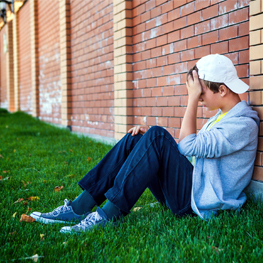
The world is a challenging place for teenagers these days, and taking that developmental journey from childhood to young adulthood is more stressful than ever. With the proliferation of social media, expectations for our teens to be popular have gone up. The risks of hurt from insults and exclusion and the fatigue from never being away from one’s online peer group can lead to all kinds of psychological and emotional problems - all of these factors, not surprisingly, are resulting in a rise of depression with our teenaged girls and boys.
Teens who are stressed academically or socially and feel like they can’t succeed are the most likely to become depressed. Teens of all temperaments can experience depression, but kids who are shy, sensitive, and not highly social-skilled are the most vulnerable. Signs of depression can include withdrawal from the family, substance abuse, self-cutting, chronic fatigue, social withdrawal, a drop in school performance, ending participation in previously enjoyed activities, eating disorders (including extreme dieting and compulsive eating) - these are all signs to look for.
Essentially, depression can be characterized as feeling “out of it,” as though the desire and energy to participate in life’s positive activities are gone. Nothing seems attractive or exciting and withdrawal from activities or engaging in self-destructive activities replaces healthy engagement. Low self-esteem can result from depression or be a contributing factor.
When parents suspect that their teen is depressed, or is showing any of the above signs, they need to take action and seek professional help. But it can’t stop there. We have to remember that our kids are in that developmental stage of life where they are learning skills for their eventual independence from us, their parents. Parents need to help them learn the life skills for managing their feelings and making healthy, self-valuing choices.
Getting the right kind of counseling is essential. Too often, counselors will work only with the teenager and include only minimal or separate counseling for the parents. The result of this approach is that parents feel disempowered and wait for the therapy to “work” rather than provide the more hands-on, active support their teenager needs.
A depressed teen will need their parents to provide emotional support and structure for engaging healthy activities including exercise, good nutrition, appropriate socialization, limited use of social media and managing their school and home responsibilities. Also, family counseling can help parents and teens end control battles that undermine teen accountability, create alienation and often create stress throughout the family. Parent-teen control battles can be a significant causal factor in teen depression as well.
Individual therapy is an important part of the treatment, too. It will help a depressed teenager learn to understand and express their most personal feelings and learn to manage them with healthy thinking and healthy behavior.
Teen depression, if thoughtfully addressed, is very treatable. With professional guidance and active parental involvement, we can help our teens regain belief in their wonderful selves and rediscover their passion for life.
Neil D. Brown, LCSW, is a family therapist, author, and podcast host. Brown has worked with families, couples, and individuals for more than 30 years. Deeply steeped in the theory and practice of family therapy, Brown uses a simple yet profound method of empowering parents and their adolescent youth to put an end to destructive control battles for good. You can read more in Brown’s new book, Ending the Parent-Teen Control Battle (available at local booksellers and online). Neil’s podcast, Healthy Family Connections, is available to download at iTunes. To learn more about Neil and his work, visit neildbrown.com.
Calgary’s Child Magazine © 2024 Calgary’s Child